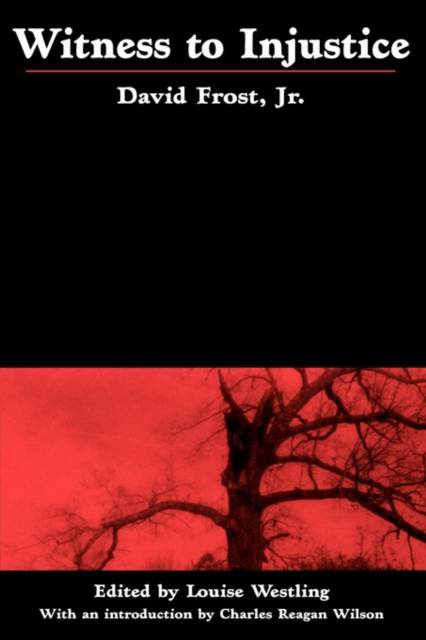
- Retrait gratuit dans votre magasin Club
- 7.000.000 titres dans notre catalogue
- Payer en toute sécurité
- Toujours un magasin près de chez vous
- Retrait gratuit dans votre magasin Club
- 7.000.0000 titres dans notre catalogue
- Payer en toute sécurité
- Toujours un magasin près de chez vous
Description
Witness to Injustice by David Frost, Jr. edited by Louise Westling with an introduction by Charles Reagan Wilson There were two events in particular that had a lasting effect on the life of David Frost, Jr. "Watching my parents make moonshine in our back yard in a washpot," he says, "and listening to my parents tell the story of how the Peterson boy was lynched here in Eufaula. My parents would tell it like it had just happened." In this compelling account of his life as an African American in Eufaula, Alabama, Frost illuminates the strange world of the rural South. He was a living witness to both the dramatic racial violence and the heroic struggles of the civil rights movement. This world included lynchings as well as the quieter activities of everyday life. His story, told honestly and earnestly, pictures an alternately violent and placid community where whites not only brutalized blacks but also came to their aid. Frost tells of the intricate web of collusion, cooperation, treachery, competition, and sometimes gleeful gamesmanship that wove together the lives of black and white people in this typical southern community. His story recounts his unique perspective on this complex social culture in which strange twists governed daily life, in which a black moonshiner evading the law might take the white sheriff hunting on his property, a culture in which a white doctor, the leader of a lynch mob, spent the rest of his life trying to atone by serving the medical needs of the black community. Although there are multitudinous analyses, narratives, and reports detailing the baffling enigmas of southern history, in this exceptional memoir a fresh, previously unheard voice reveals cultural complexities that most historians have neglected. David Frost, Jr. (deceased) lived in Eufaula, Alabama. Louise Westling is Professor Emerita of English at the University of Oregon. Charles Reagan Wilson is a professor of history and southern studies at the University of Mississippi.
Spécifications
Parties prenantes
- Auteur(s) :
- Editeur:
Contenu
- Nombre de pages :
- 138
- Langue:
- Anglais
Caractéristiques
- EAN:
- 9781604738865
- Date de parution :
- 01-10-95
- Format:
- Livre broché
- Format numérique:
- Trade paperback (VS)
- Dimensions :
- 152 mm x 229 mm
- Poids :
- 213 g

Les avis
Nous publions uniquement les avis qui respectent les conditions requises. Consultez nos conditions pour les avis.






